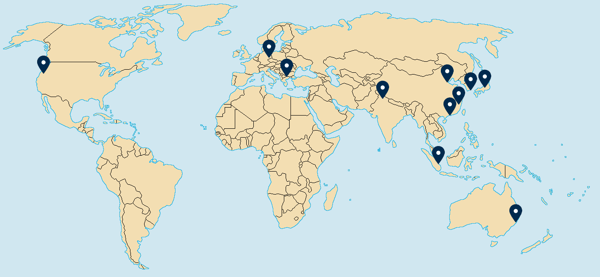Wacom is dedicated to making the world a more creative place. Wacom focuses on connecting people w
ith technology through powerful new tools of connectivity and expression that influence every aspect of our lives.
Wacom provides digital technologies, such as high-end pen tablets, to support creative expression and innovate new business solutions. The impact of their mission has proven to be industry and location agnostic. Their clients span industries from film and design, to medicine, education, and finance.
The “One Wacom” Vision: Strategic Partnership
Redapt was attracted to Wacom as a client because of the alignment in vision of connecting people to technology, as well as their desire for a transformation to handle growth.
Wacom, despite being a global company, had been operating in regional silos for a long time. Supply chain management was fragmented, handled compartmentally by geography and business unit, through a combination of manual processes. To support their unprecedented growth, Wacom approached Redapt to help them transform to a new “One Wacom” vision.
Wacom Director of BI Technology and Data Management, Balaji Ganesan, explained:
“When Wacom was evaluating an implementation partner for the BI Platform architecture and development, we reviewed several partners. Through strong references from colleagues who had worked earlier with Redapt, we selected them for BI platform architecture. Over time, Redapt has become our go to partner for any new initiatives in the area of Microsoft technologies (SQL Server, Sharepoint, Operational Data Store, Azure).”
The “One Wacom” vision would unify the regional silos and consolidate IT resources through several steps needed, including:
- Migrating to a cloud based system
- Investing into centralized systems: CRM, ERP, Web
- Enabling a central data platform to be leveraged for future Business Intelligence initiatives
Designing Scalability, Global Unity, and Intelligent Tools
Wacom sought to in leverage the cloud to achieve their vision, choosing to architect a Data Platform on Microsoft Azure. Migrating to the cloud would allow for seamless process as the business flow moved from their headquarters in Japan, to sales and marketing in Europe, to product development in the US.
According to Redapt Practice Director, Peter Parker, Microsoft Azure was a logical fit because it flattened resources and operations so that it was less about where work was being done and more about the work itself. Moving onto Azure also enabled Redapt to establish the integration strategy for applications such as CRM Online and Office 365.
Beyond improving supply chain management, Redapt demonstrated additional value of Azure. Wacom had several piecemeal, ERP-level, reporting systems. The finance team had no way of correlating operational information to financial information. Redapt provided data modeling and data platform design to create a prescriptive process with end-to-end analytics planning. Built with SQL on Azure, the new data warehouse allowed for a much clearer picture into financial reporting and forecasting.
Building the Global Demand Planning Tool
Once the migration to Azure was complete, Redapt and Wacom began to discuss how Wacom could digitally transform its organization with business intelligence. Wacom used a global demand planning tool, JDA. JDA received information directly from the source systems where data was not always consistent due to time-delays and system redundancies.
A new platform was needed, and goals included.
According to Balaji, “Since most of Wacom’s implementation was built from ground up, these capabilities did not exist prior to Redapt engagement”.
Redapt designed and implemented a new integration layer, Operational Data Store (ODS), which facilitated the integration of multiple Line of Business Systems into JDA. Built on a SQL Server backend, ODS integrates quality data from over 30 locations.

With ODS, quality data is distributed to relevant parties allowing for real-time intelligent supply planning, order processing, and logistics. Along with improving supply chain planning, ODS ultimately allows for a better experience for customers, employees, and stakeholders.
To ensure successful development and deployment, Redapt used Visual Studio Team Foundation Server (TFS) as source control. Using TFS, Redapt created two branches that allowed for new development while continually supporting the current production system.
Achieving a Global, Intelligent Solution
The migration onto Azure enabled hundreds of Wacom employees to use their systems globally, with no downtime. In addition, ODS was built in a modular way to support changing business requirements. Balaji explains:
“Operationally, we were able to build a centralized data warehousing platform to support our analytics and reporting, develop an operational data store to enable automated demand and supply planning and deliver workflow capabilities for our users.”
Redapt is proud of the success of this project, proving the scalability and global ability of Azure as well as the impact of intelligent, real-time data analysis. More importantly, Wacom is happy with the transformation.
As Balaji described, “Redapt’s expertise in Microsoft technologies has been the biggest factor for Wacom. Redapt team’s ability to understand the Wacom business process in depth and provide solutions, their ability to be adaptable and flexible has been key considerations."















